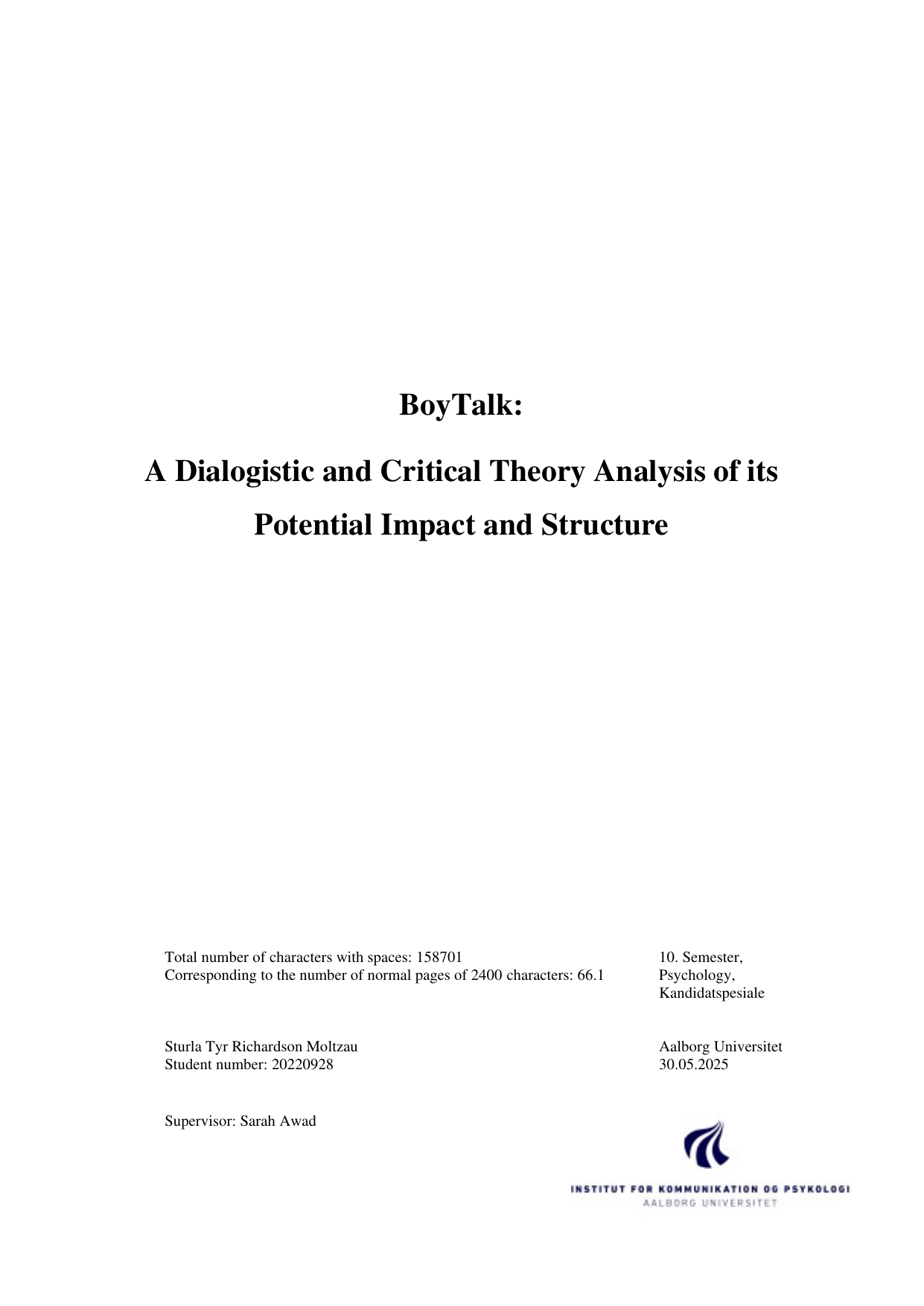
BoyTalk: A Dialogistic and Critical Theory Analysis of its Potential Impact and Structure
Term
4. term
Education
Publication year
2025
Submitted on
2025-05-30
Pages
71
Abstract
This paper in an exploratory study on the need for a gender-matching and dyadic online-counselling services for males, e.g., BoyTalk, especially with the consideration that GirlTalk already exists. It is grounded in an interpretivist theory of science, emphasizing the co-construction of meaning and the Self within dialogical contexts that are enveloped by culture through cultural narratives and norms. Drawing from dialogistic theoretical frameworks such as Dialogical Theory of Selfhood and Culturally Inclusive Action Theory for understanding the Self and identity. It also reflects the critical theoretical tradition, particularly the work of Simone de Beauvoir, with the aim to examine how the normative gender dichotomy of masculinity/femininity has a dynamic that traditionally placed males within an oppressor role, which has now become a cage that constricts male’s ability to identify with the positive gender norms that are contained within femininity, particularly help-seeking and emotional vulnerability. The methodology is therefore informed by both constructivist and critical epistemologies, and not an objectivist biological perspective. The paper also explores how the current basic methods that GirlTalk currently employs for how to conduct the conversations on the platform can be modelled within the dialogistic frameworks that is employed within the paper, and how they be applicable for BoyTalk as well. These methods are the Socratic method, radical acceptance and positive regard, and the use of mentalizing activities. The specific issues of interest were bullying, finding a partner, small penis anxiety and micropenises, consent, academic attainment, loneliness, suicide, well-being, and neurodivergence. Furthermore, the paper also sought to establish how the approach GirlTalk uses might be applied to those issues with the dialogistic framework in mind. Finally, it sought to explore how the BoyTalk’s presence, image, and its marketing might affect the wider culture, how one could employ the dialogistic framework to best organize BoyTalk to allow for it to flexibly and dynamically face barriers, as well as some structural realities one might have to consider when establishing it. Based on the results found in this paper, it seems likely that there is a need for such a service and that it could provide a positive impact for the individual users, and a larger positive cultural and scientific impact both nationally and internationally.
This paper in an exploratory study on the need for a gender-matching and dyadic online-counselling services for males, e.g., BoyTalk, especially with the consideration that GirlTalk already exists. It is grounded in an interpretivist theory of science, emphasizing the co-construction of meaning and the Self within dialogical contexts that are enveloped by culture through cultural narratives and norms. Drawing from dialogistic theoretical frameworks such as Dialogical Theory of Selfhood and Culturally Inclusive Action Theory for understanding the Self and identity. It also reflects the critical theoretical tradition, particularly the work of Simone de Beauvoir, with the aim to examine how the normative gender dichotomy of masculinity/femininity has a dynamic that traditionally placed males within an oppressor role, which has now become a cage that constricts male’s ability to identify with the positive gender norms that are contained within femininity, particularly help-seeking and emotional vulnerability. The methodology is therefore informed by both constructivist and critical epistemologies, and not an objectivist biological perspective. The paper also explores how the current basic methods that GirlTalk currently employs for how to conduct the conversations on the platform can be modelled within the dialogistic frameworks that is employed within the paper, and how they be applicable for BoyTalk as well. These methods are the Socratic method, radical acceptance and positive regard, and the use of mentalizing activities. The specific issues of interest were bullying, finding a partner, small penis anxiety and micropenises, consent, academic attainment, loneliness, suicide, well-being, and neurodivergence. Furthermore, the paper also sought to establish how the approach GirlTalk uses might be applied to those issues with the dialogistic framework in mind. Finally, it sought to explore how the BoyTalk’s presence, image, and its marketing might affect the wider culture, how one could employ the dialogistic framework to best organize BoyTalk to allow for it to flexibly and dynamically face barriers, as well as some structural realities one might have to consider when establishing it. Based on the results found in this paper, it seems likely that there is a need for such a service and that it could provide a positive impact for the individual users, and a larger positive cultural and scientific impact both nationally and internationally.
Keywords
Documents
